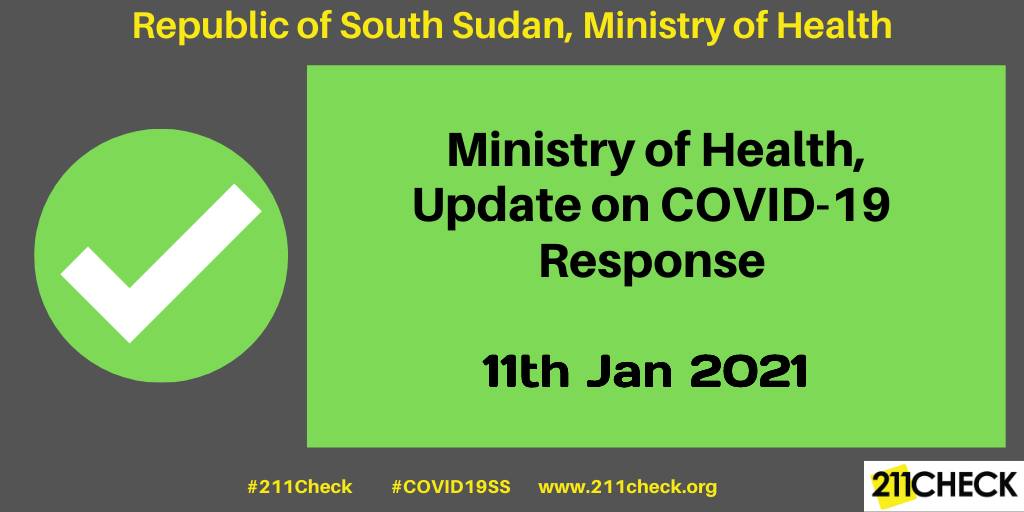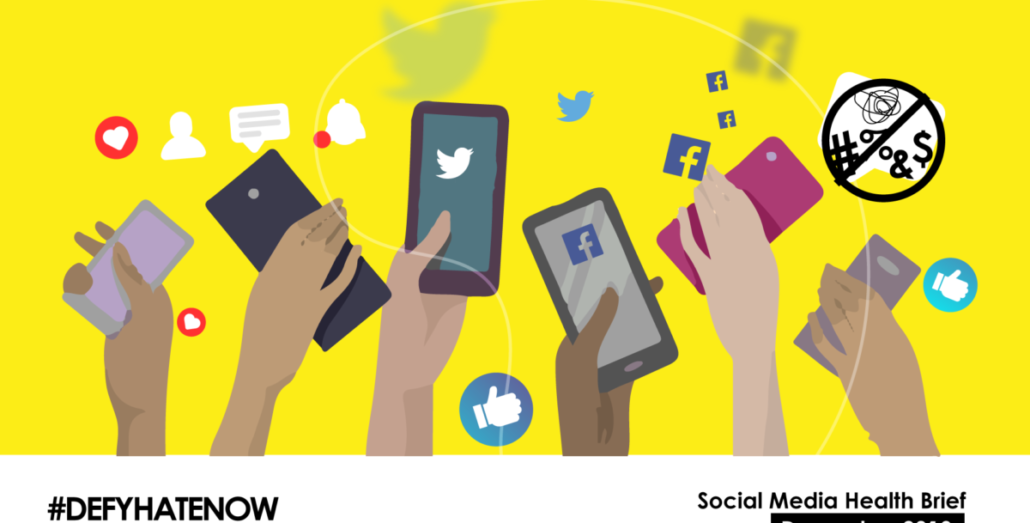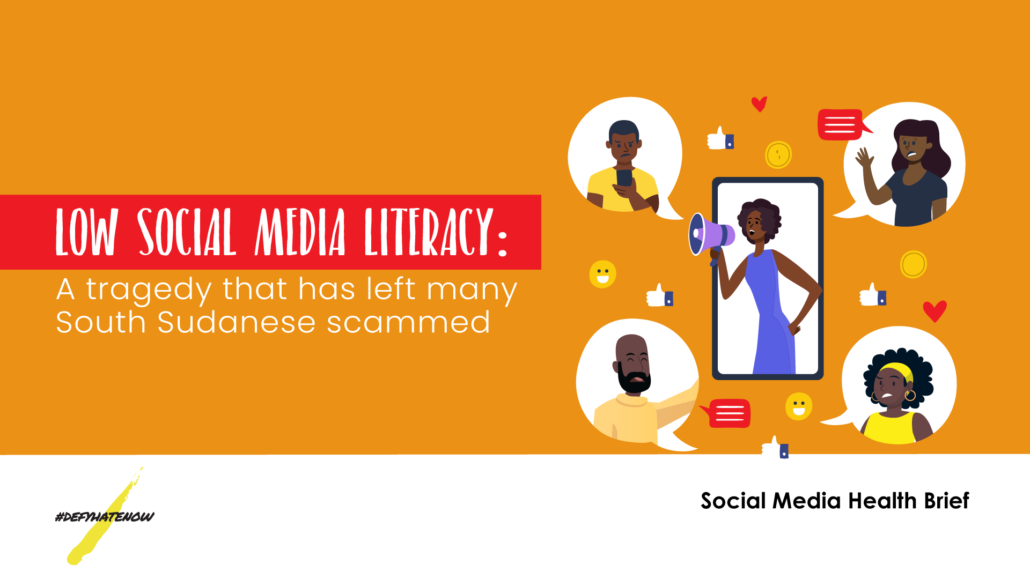Did you know that Facebook and Twitter have policies against Hate Speech?
/in Social Media Health ReportIt would be accurate to say that the biggest amounts of hate speech and misinformation are circulated on social media platforms, most notably Facebook and Twitter. This is not in the least surprising since most of these perpetrators feel powerful hiding behind the keyboard and therefore social media platforms provide the most expected outlets. But did you know that Facebook and Twitter have well-established policies that prohibit hate speech and the spread of misinformation?
The aim of these policies is to protect their users against being victims of hate speech and misinformation that is rampant on social media. They also aim at creating a safe environment through which users can freely interact regardless of their diverse backgrounds and affiliations. For countries like South Sudan, where in the past online hate speech has led to the escalation of the war, awareness of these policies amongst online users alone would encourage cautiousness in social media use, resulting in a trusting environment amongst South Sudanese with different backgrounds.
With such measures in place, the occurrence of Hate speech and misinformation can easily be reported to Facebook and Twitter, after which such posts can be taken down. These policies act as guidelines through which acceptable conduct can be attained on the social media platforms, consequently leading to the eradication of hate speech and misinformation as well as lasting peace. They also aim at creating a safe environment through which users can freely interact regardless of their diverse backgrounds and affiliations. The images show parts of the Facebook and Twitter policies which any user can access on their respective websites.
#DefyHateNow Thought of The Week: Through the development of these policies, both Facebook and Twitter have taken major steps in the efforts towards combating hate speech and misinformation online. Our part, therefore, as users of these platforms is to ensure that we utilize the tools handed to us in the fight against hate speech and misinformation through the avoidance of hate speech and misinformation for instance or reporting occurrences of the same.
Interact with us on our Social Media platforms; Facebook, Twitter and Instagram.
Low social media literacy: a disaster that has left many South Sudanese scammed
/in Social Media Health ReportJust nine years down from independence after 21 years of brutal civil war with Sudan, South Sudan was left with no or poor infrastructural development. Specifically, technological development was as well left at a standstill.
About a week ago, Tufts University ranked Kenya, Rwanda and Tanzania leading countries in digital growth and development in East African. Meanwhile, South Sudan got its first-ever connection to the region and the world last year when three fiber optic companies established offices in Juba – an event that made citizens joyous, particularly those within the capital Juba where most services are based.
In the past and currently, many citizens have and continue to remain unexposed to technological developments. Reports say telecom companies have been the only internet service providers, which at times don’t reach states levels.
According to UNICEF, 7% of South Sudanese across the country have access to the internet. And with low or incomplete digital literacy, especially on social media, many citizens have
become victims of online scams, such as social media accounts hacking and human trafficking, among others. 
One of the messages sent to Jansku’s Facebook contact by the hacker.
For instance, Jansuk Samuel, one of the victims says his Facebook account was hacked last month and used for financial assistance requests such as calls for funeral-financial related supports.
According to Jansuk, he was not aware of the occurrences until a friend who was asked for assistance called to inquire about his alleged mother’s cancer admission.
“When I called Jansuk to tell him what happened, he was shocked. If I was not in Uganda and didn’t ask to visit the hospital, I guess I would have no idea about the agenda behind the message and might have become a victim of a scam.
“As I speak to you, I am worried because there might a lot of people that didn’t survive the deception they were placed in. Junsuk told me he still doesn’t have access to the account since last month. I am just imaging the people this hacker is tricking now” Juan, the friend, expressed fears.
In a related incident, the National Communication Authority Director-General – Adok Gai earlier last week told 211Check that the institution could not help a South Sudanese national who lost $90,000 to online scammers months ago on a Mercedes Benz car importation related deal.
“We have someone who lost about $90,000. This was someone who was told he won a Mercedes worth $300,000 and it was stuck in Mombasa and the person insisted and sent that money to those people, who later turned out to be scammers. After sending, the scammers switched off their numbers. This person reported to us and we couldn’t help because of the structures we have. Many people have been exploited due to poor data protection and low digital literacy” said Adok.
Mr. Adok appeals to many South Sudanese to be very vigilant while on various social media platforms.
“They use Facebook Messenger and purport to be ministers stuck in a foreign land and needing to be helped. And as a minister, many have always responded in return of something.
“However, many have always offered low assistance because of their low income. But it depends on how social the minister is. Imagine, if a person is impersonating the minister of petroleum, how much volume of money can be lost” said Adok.
Reporting
As cases continue to grow and more South Sudanese are being scammed online, the National Police say it has no proper data on these crimes, claiming that people don’t report.
“We have heard of these cases as formal talks. It’s really disgraceful that our people don’t report such incidents. Many think when they report, they will be mocked in the community that they are fools.
“This is one of the challenges we are facing, and as a result, we as police need to do some awareness so that these cases are reported so that those people to be brought to book,” said Maj. Gen. Daniel Justice – police spokesperson.
In order to mitigate or avoid such occurrences, the National Communication Authority and police authorities appeal to online users to always be cautious while online as the country embarks on the drafting and enactment of Cyber Crime Law.
#defyhatenow’s insight for December: Social media platforms like Facebook have policies against conduct such as hacking and the creation of fake accounts. You can read more here. This means such suspicious activities can be reported.
Continue the conservation with us on our social media platforms – Twitter, Facebook, and Instagram.
Fact-Checking & Information Verification In South Sudan
211 Check is South Sudan’s first and only independent fact-checking and information verification flagship project established by Defyhatenow in March 2020 to counter COVID-19 dis/misinformation but has since grown in its scope of work. It became a signatory of the International Fact-checking Network’s (IFCN) Code of Principles in March 2023.
If you believe that 211 Check is violating the IFCN Code of Principles, you can report this through the complaints page on the IFCN site.





